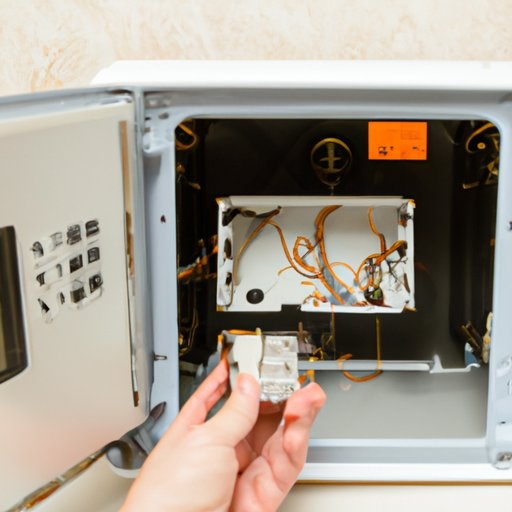Introduction
When you’re trying to enjoy a delicious meal, the last thing you want is for your microwave to start acting up. If your microwave has been tripping the circuit breaker, you may be wondering why this is happening and how to fix it. In this article, we’ll explore the common causes of a tripping microwave circuit breaker and provide a guide to diagnosing and fixing the issue.
Exploring the Common Causes of a Tripping Microwave Circuit Breaker
There are several potential causes of a tripping microwave circuit breaker. The most common ones include overloaded circuits, faulty wiring, damaged outlets, and faulty appliances. Let’s take a closer look at each of these.
Overloaded Circuits
If your circuit is overloaded with too many appliances, then it can cause the circuit to trip. This is particularly true if you’re using an extension cord to power your microwave. Extension cords should never be used to power any appliance that draws more than 10 amps of current. If your microwave exceeds this limit, then it could be causing the circuit to trip.
Faulty Wiring
If your home has older wiring, then it could be the cause of the tripping circuit breaker. Faulty wiring can cause a short circuit, which causes the circuit breaker to trip. You should have an electrician inspect your wiring if you suspect this is the cause of the problem.
Damaged Outlets
Damaged outlets can also cause the circuit breaker to trip. This is because the outlet may not be able to handle the amount of current being drawn by the appliance. If you suspect this is the case, then you should replace the outlet with one that is rated for the proper amount of current.
Faulty Appliances
Finally, faulty appliances can cause the circuit breaker to trip. This is usually due to a short circuit or a malfunctioning component in the appliance. If your microwave is experiencing this issue, then you should contact the manufacturer for assistance.
Safety First: How to Troubleshoot a Tripping Microwave Circuit Breaker
Before attempting to diagnose and fix the issue, it’s important to take safety precautions. To do this, you should unplug all other appliances from the circuit and check the breaker panel to make sure nothing else is drawing power from the circuit. Then, you should test the circuit with a voltage tester to ensure there is no power running through it.
A Guide to Diagnosing and Fixing a Tripping Microwave Circuit Breaker
Once you’ve taken the necessary safety precautions, you can start to diagnose and fix the issue. Some of the most common solutions include replacing old or faulty wiring, replacing outlets, and replacing the microwave. Let’s take a closer look at each of these.
Replacing Old or Faulty Wiring
If your home has older wiring, then it could be the cause of the tripping circuit breaker. To fix this, you should have an electrician inspect your wiring and replace any old or faulty wires. This will help to ensure that your circuit is able to handle the load of your appliance.
Replacing Outlets
If your outlets are damaged, then they may not be able to handle the amount of current being drawn by the appliance. To fix this, you should replace the outlet with one that is rated for the proper amount of current.
Replacing the Microwave
Finally, if the issue persists, then you may need to replace the microwave. This is usually due to a short circuit or a malfunctioning component in the appliance. If your microwave is experiencing this issue, then you should contact the manufacturer for assistance.

How to Prevent Your Microwave from Tripping Your Circuit Breaker
To prevent your microwave from tripping the circuit breaker, you should install a dedicated circuit for the appliance. This will ensure that the circuit is able to handle the load of the appliance without tripping. Additionally, you should add a ground fault circuit interrupter (GFCI) to the circuit for added protection. Finally, you should avoid using extension cords to power the appliance.

What to Do When Your Microwave Keeps Tripping the Breaker
If your microwave keeps tripping the breaker, then you should first reset the breaker. If this doesn’t work, then you should call an electrician to inspect your wiring and outlets. If the issue persists, then you should contact the manufacturer of the appliance for assistance.

Understanding the Reasons for a Tripping Microwave Circuit Breaker
When troubleshooting a tripping microwave circuit breaker, it’s important to understand the reasons why it’s happening. The most common causes include overloading, short circuiting, and ground faults. Overloading occurs when too much current is drawn from the circuit. Short circuiting happens when a wire comes into contact with another wire, creating a direct connection. And ground faults occur when the appliance is not properly grounded.
Conclusion
When your microwave keeps tripping the breaker, it’s important to understand why this is happening and how to fix it. This article explored the common causes of a tripping microwave circuit breaker and provided a guide to diagnosing and fixing the issue. By following the steps outlined in this article, you can safely and effectively troubleshoot and fix the issue.
(Note: Is this article not meeting your expectations? Do you have knowledge or insights to share? Unlock new opportunities and expand your reach by joining our authors team. Click Registration to join us and share your expertise with our readers.)
